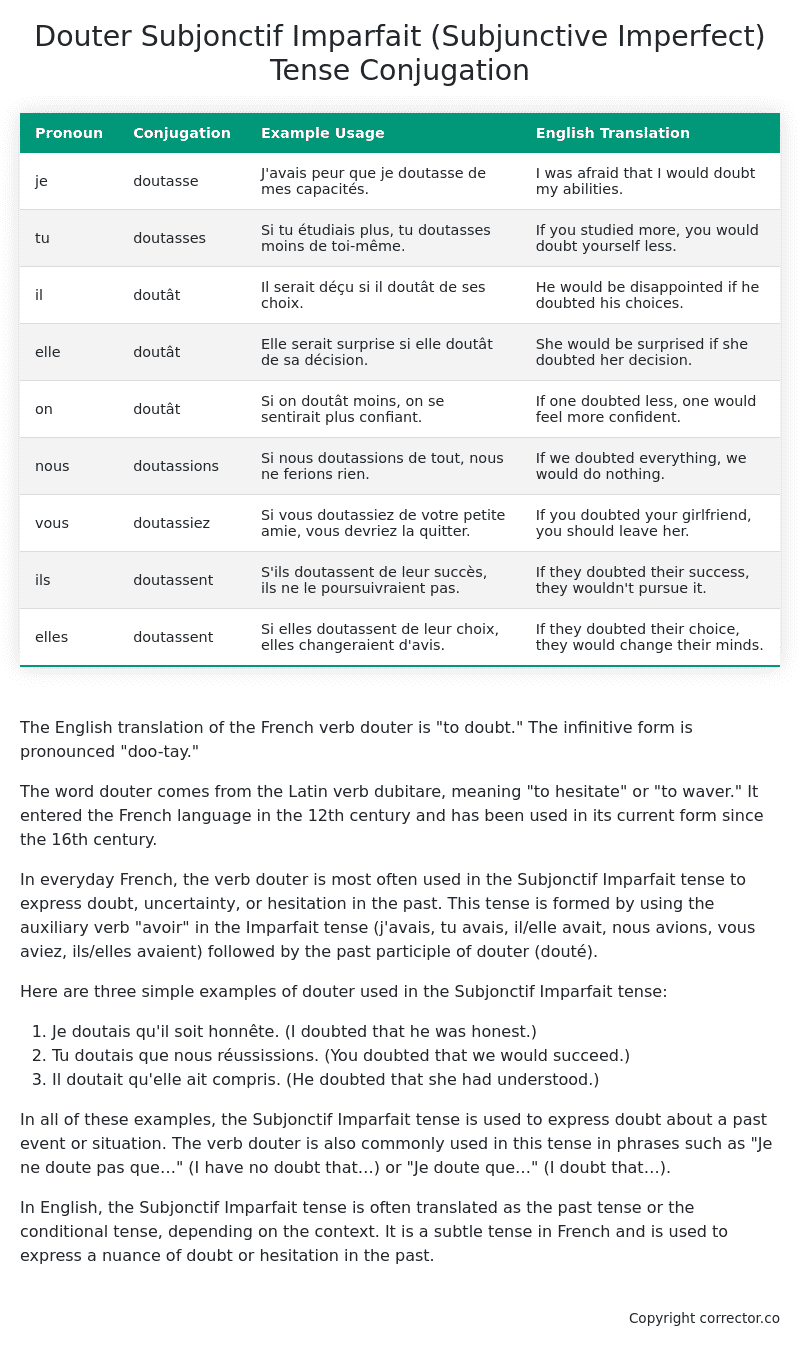Subjonctif Imparfait (Subjunctive Imperfect) Tense Conjugation of the French Verb douter
Introduction to the verb douter
The English translation of the French verb douter is “to doubt.” The infinitive form is pronounced “doo-tay.”
The word douter comes from the Latin verb dubitare, meaning “to hesitate” or “to waver.” It entered the French language in the 12th century and has been used in its current form since the 16th century.
In everyday French, the verb douter is most often used in the Subjonctif Imparfait tense to express doubt, uncertainty, or hesitation in the past. This tense is formed by using the auxiliary verb “avoir” in the Imparfait tense (j’avais, tu avais, il/elle avait, nous avions, vous aviez, ils/elles avaient) followed by the past participle of douter (douté).
Here are three simple examples of douter used in the Subjonctif Imparfait tense:
- Je doutais qu’il soit honnête. (I doubted that he was honest.)
- Tu doutais que nous réussissions. (You doubted that we would succeed.)
- Il doutait qu’elle ait compris. (He doubted that she had understood.)
In all of these examples, the Subjonctif Imparfait tense is used to express doubt about a past event or situation. The verb douter is also commonly used in this tense in phrases such as “Je ne doute pas que…” (I have no doubt that…) or “Je doute que…” (I doubt that…).
In English, the Subjonctif Imparfait tense is often translated as the past tense or the conditional tense, depending on the context. It is a subtle tense in French and is used to express a nuance of doubt or hesitation in the past.
Table of the Subjonctif Imparfait (Subjunctive Imperfect) Tense Conjugation of douter
| Pronoun | Conjugation | Example Usage | English Translation |
|---|---|---|---|
| je | doutasse | J’avais peur que je doutasse de mes capacités. | I was afraid that I would doubt my abilities. |
| tu | doutasses | Si tu étudiais plus, tu doutasses moins de toi-même. | If you studied more, you would doubt yourself less. |
| il | doutât | Il serait déçu si il doutât de ses choix. | He would be disappointed if he doubted his choices. |
| elle | doutât | Elle serait surprise si elle doutât de sa décision. | She would be surprised if she doubted her decision. |
| on | doutât | Si on doutât moins, on se sentirait plus confiant. | If one doubted less, one would feel more confident. |
| nous | doutassions | Si nous doutassions de tout, nous ne ferions rien. | If we doubted everything, we would do nothing. |
| vous | doutassiez | Si vous doutassiez de votre petite amie, vous devriez la quitter. | If you doubted your girlfriend, you should leave her. |
| ils | doutassent | S’ils doutassent de leur succès, ils ne le poursuivraient pas. | If they doubted their success, they wouldn’t pursue it. |
| elles | doutassent | Si elles doutassent de leur choix, elles changeraient d’avis. | If they doubted their choice, they would change their minds. |
Other Conjugations for Douter.
Le Present (Present Tense) Conjugation of the French Verb douter
Imparfait (Imperfect) Tense Conjugation of the French Verb douter
Passé Simple (Simple Past) Tense Conjugation of the French Verb douter
Passé Composé (Present Perfect) Tense Conjugation of the French Verb douter
Futur Simple (Simple Future) Tense Conjugation of the French Verb douter
Futur Proche (Near Future) Tense Conjugation of the French Verb douter
Plus-que-parfait (Pluperfect) Tense Conjugation of the French Verb douter
Passé Antérieur (Past Anterior) Tense Conjugation of the French Verb douter
Futur Antérieur (Future Anterior) Tense Conjugation of the French Verb douter
Subjonctif Présent (Subjunctive Present) Tense Conjugation of the French Verb douter
Subjonctif Passé (Subjunctive Past) Tense Conjugation of the French Verb douter
Subjonctif Imparfait (Subjunctive Imperfect) Tense Conjugation of the French Verb douter (this article)
Subjonctif Plus-que-parfait (Subjunctive Pluperfect) Tense Conjugation of the French Verb douter
Conditionnel Présent (Conditional Present) Tense Conjugation of the French Verb douter
Conditionnel Passé (Conditional Past) Tense Conjugation of the French Verb douter
L’impératif Présent (Imperative Present) Tense Conjugation of the French Verb douter
L’infinitif Présent (Infinitive Present) Tense Conjugation of the French Verb douter
Struggling with French verbs or the language in general? Why not use our free French Grammar Checker – no registration required!
Get a FREE Download Study Sheet of this Conjugation 🔥
Simply right click the image below, click “save image” and get your free reference for the douter Subjonctif Imparfait tense conjugation!

Douter – About the French Subjonctif Imparfait (Subjunctive Imperfect) Tense
Formation
Common Everyday Usage Patterns
Interactions with Other Tenses
Subjonctif Présent
Indicatif Passé Composé
Conditional
Conditional Perfect
Summary
I hope you enjoyed this article on the verb douter. Still in a learning mood? Check out another TOTALLY random French verb conjugation!


